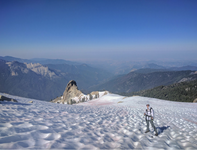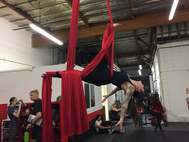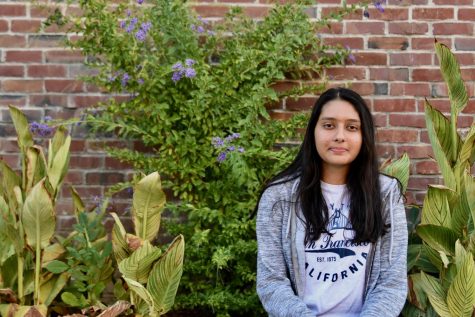French teacher Sarah Finck vividly remembers skiing down the slopes of Massachusetts as a child. She remembers the snowy landscape blurring into a mass of white, the cold mountain air whipping against her face. She remembers the exhilaration she felt, the rush and excitement. But most of all, she remembers the peacefulness washing over her as she surveyed the serene landscape.
A few decades later, not much has changed. To this day, Finck remains an advanced skier and a passionate backpacker whose desire for adventure has led her across California, through sinewy trails and winding paths of greenery with only one mission in mind — to appreciate every crevice of nature.

“I like the smell of the fresh air and the beauty of nature and understanding,” Finck said. “I like the feeling of being very small and alone in the world with maybe some mosquitoes buzzing around me, but that’s it.”
An experienced athlete, Finck was first exposed to skiing and backpacking as a child, when her father used to drag her and her sister out to the mountains in an effort to instill an appreciation for nature in his daughters. Her father’s plan worked, for Finck now makes an active effort to integrates these activities in her adult life.
“I started cross-country skiing when I could walk with my parents,” Finck said. “In Massachusetts, you would drive one second and you would be in a field where you could go skiing. Here, it is worth it because the size [of the mountains] is so impressive. In [the] winter, I go to Tahoe frequently with my sister and some friends. We’ve been renting a house for the season for two years.”
Like Finck, math teacher Katie Collins’ passion for surfing stems from her childhood. A skilled swimmer and water polo player, she had always wanted to try surfing, but was never presented the opportunity to do so until years later.
“I started surfing when I was almost thirty,” Collins said. “I always loved the ocean and going to the beach. I grew up playing water polo and swimming, so it just seemed like [surfing] was something that I should learn to do.”
To train, Collins attended a women’s surf camp in Central America. There, she learned the rules of surfing, a skill that would later aid her while she surfed the waves of Santa Cruz and Monterey with her husband.
“The ocean is not a nice place,” Collins said. “We think it’s nice, but it’s ferocious. Nothing is ever the same and there are so many unhidden rules to it.”
While Collins acknowledges the dangers of surfing, she does not let it deter her. Similarly, English teacher Jessica Kaufman’s passion for aerial dancing outweighs the potential risks of the activity. Aerial dancing is a theatrical art which involves hanging from ribbons.
“I always thought [aerial dance] was really cool, and I loved Cirque de Soleil growing up,” Kaufman said. “Finally, a few years ago, I decided to try it and I found a class and started doing it. It’s insanely hard. They make it look so easy, but it is not in any single way.”
Collins echoes a similar sentiment regarding surfing. She explains that surfing requires a high degree of devotion and perseverance to succeed at. Collins also believes that people need to be aware of their own skill set to ensure their own safety, as the ocean can be ferocious and brutal.
“It’s one of the hardest things you can learn to do,” Collins said. “[In] the ocean, every single thing is different. Every single time you paddle for a wave, it’s different than the time before you paddled. I fell a lot. I got held down by the water a lot. I got pulled down by the water. I would say [this is] perseverance, most definitely.”

This theme of perseverance is found in Finck, Collins and Kaufman’s hobbies, all of whom struggled when they first began their sports. They said the most difficult part of a sport is when they are overcome with exhaustion and success seems impossible.
“[During skiing], it was cold and I would get frustrated,” Finck said. “[The backpacking] wasn’t always so pleasant. As a kid, it’s hard, it’s tiring, it hurts and it’s long. But it made me appreciate the outdoors and the mountains and the challenge of climbing to the top of something very steep.”
Despite the struggles and hardships of the activities, completing her goal and achieving what may have seemed like an insurmountable feat is what makes the entire activity so valuable to Finck. She explains that these activities have molded her into the person she is today— someone who isn’t afraid of hard work and is capable of seeing through anything she puts her mind to.
“It gave [my sister and I] a typical New England identity of confronting challenges,” Finck said. “Like a hardy exterior, that does make you confront these challenges. I think something in my brain remembers the reward at the top, like when I think about the beautiful view that I had of being on top of Mount Whitney, the tallest mountain in the lower 48 states. You can’t get that beauty without struggling up the hill. I know that I can do it.”










